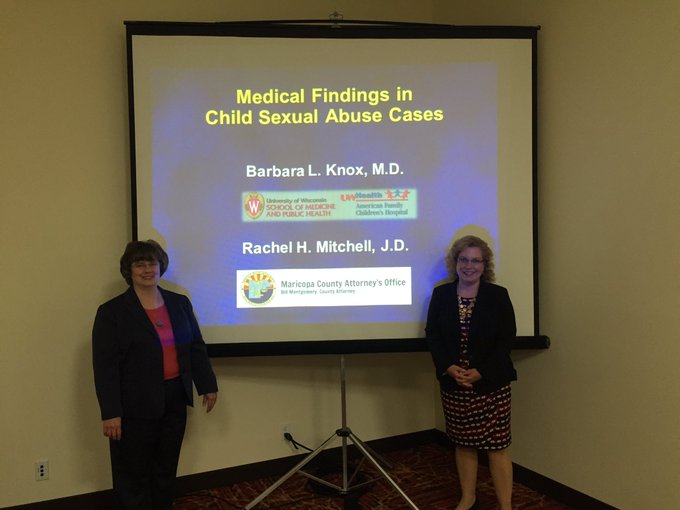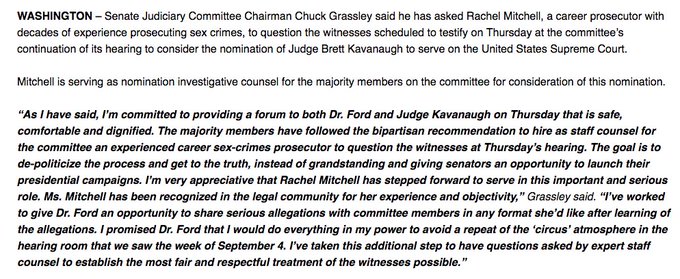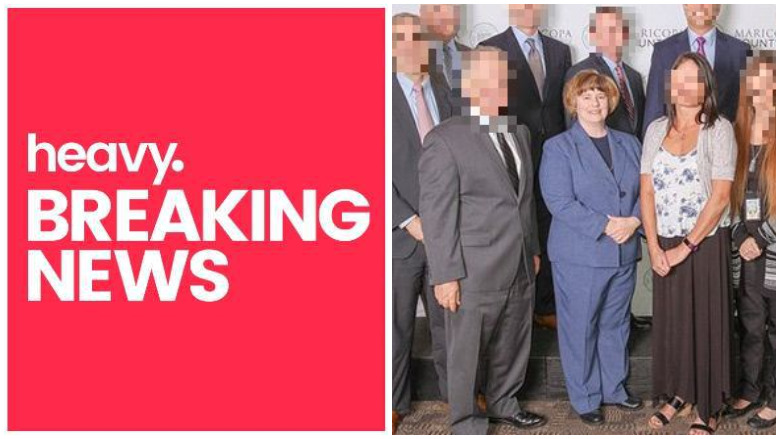
Rachel Mitchell, a veteran sex crimes prosecutor from Maricopa County, Arizona, has been named as the woman who will question Dr. Christine Blasey Ford during the September 27, 2018 Senate Judiciary Committee hearing into the nomination of Judge Brett Kavanaugh to the U.S. Supreme Court.
In a statement, Senate Judiciary Committee Chairman Chuck Grassley confirmed that Republicans on the Committee had asked Mitchell to “question the witnesses scheduled to testify on Thursday at the committee’s continuation of its hearing to consider the nomination of Judge Brett Kavanaugh to serve on the United States Supreme Court.”
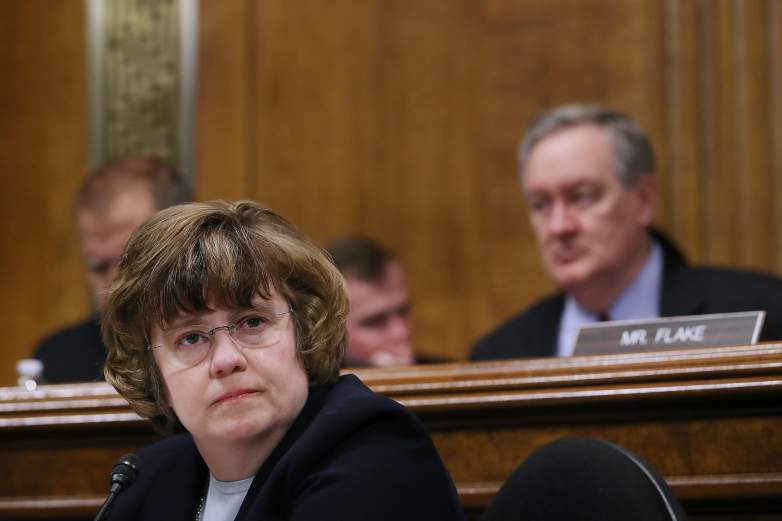
GettyRachel Mitchell, the chief of the Special Victims Division of the Maricopa County attorneyÕs office in Arizona, prepares to question Christine Blasey Ford on behalf of Republican members of the Senate Judiciary Committee in the Dirksen Senate Office Building on Capitol Hill September 27, 2018 in Washington, DC
Mitchell is an award-winning sex crimes prosecutor in Arizona, although her position in Maricopa County has caused some criticism online due to a rape kit backlog and the proximity to the Maricopa County Sheriff’s Office once helmed by Donald Trump-backing Sheriff Joe Arpaio. The Sheriff’s Office is a different agency from the prosecutor’s office that has employed Rachel Mitchell for more than two decades.
Here’s what you need to know:
1. Grassley Called Rachel Mitchell a Career Prosecutor With Decades of Experience but Dr. Ford’s Attorneys Opposed an Outside Counsel
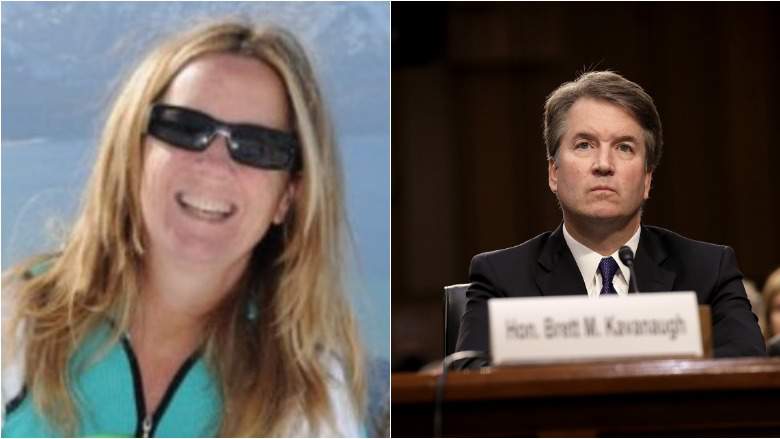
Judge Brett Kavanaugh and Dr. Christine Blasey Ford.
In his statement, Chuck Grassley praised Rachel Mitchell’s career. Grassley said that Mitchell has “decades of experience prosecuting sex crimes,” calling her a “career prosecutor.”
He added, “As I have said, I’m committed to providing a forum to both Dr. Ford and Judge Kavanaugh on Thursday that is safe, comfortable and dignified. The majority members have followed the bipartisan recommendation to hire as staff counsel for the committee an experienced career sex-crimes prosecutor to question the witnesses at Thursday’s hearing.”
Although critics have alleged the GOP Senators just don’t want the bad optics of an all-male panel questioning Ford, Grassley gave another motive. “The goal is to de-politicize the process and get to the truth, instead of grandstanding and giving senators an opportunity to launch their presidential campaigns,” Grassley said.
“I’m very appreciative that Rachel Mitchell has stepped forward to serve in this important and serious role. Ms. Mitchell has been recognized in the legal community for her experience and objectivity. I’ve worked to give Dr. Ford an opportunity to share serious allegations with committee members in any format she’d like after learning of the allegations. I promised Dr. Ford that I would do everything in my power to avoid a repeat of the ‘circus’ atmosphere in the hearing room that we saw the week of September 4. I’ve taken this additional step to have questions asked by expert staff counsel to establish the most fair and respectful treatment of the witnesses possible.”
However, Ford’s attorneys have repeatedly objected to the Senate Judiciary Committee using an outside lawyer to question Ford. Michael Bromwich, an attorney for Ford, said previously in a statement, “This is not a criminal trial for which the involvement of an experienced sex crimes prosecutor would be appropriate. Neither Dr. Blasey Ford nor Judge Kavanaugh is on trial. The goal should be to develop the relevant facts, not try a case.”
2. Rachel Mitchell Is on Leave From the Maricopa County Attorney’s Office in Phoenix, Arizona
Rachel Mitchell is a prosecutor from Arizona, but she’s now on leave.
“Mitchell worked in the Maricopa County Attorney’s Office in Phoenix as the chief of the Special Victims Division, which covers sex crimes and family violence,” reported 12News.
CNN reported that Mitchell is currently on leave from her position as “the deputy county attorney and as the chief of the Special Victims Division” in Maricopa County.
Mitchell was pictured in the County attorney’s newsletter as part of a team that won an award, and a post on Twitter indicates she spoke at a conference about medical findings in child sex abuse cases.
“Operation Safe Treat is a partnership between the MCAO, US Marshal’s Office, several local police departments and the Maricopa County Probation Department which sends teams of officers out to the community in the weeks leading up to and on Halloween checking on registered sex offenders to ensure they are following the rules,” the caption with the photo in the County Attorney’s newsletter read.
In 2014, a commission recommended her as a possible judicial candidate in Arizona.
3. Rachel Mitchell Is a Registered Republican Who Was Drawn to Her Prosecution Area Because of the Vulnerability of Children
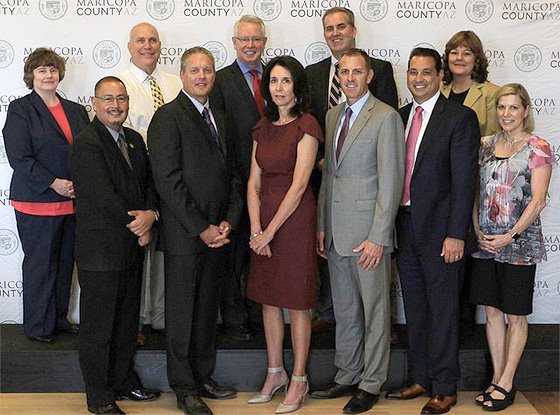
MCAO staff pictured: Special Victims Division Director Rachel Mitchell, Sex Crimes Bureau Chief Yigael Cohen, County Attorney Bill Montgomery, Major Offenders Division Director Jon Eliason, Legal Management Assistant Rhonda Eisenhour, Victims Services Division Director Shawn Cox
Rachel Mitchell is a registered Republican, according to the Washington Post, which reports that she’s worked in the Maricopa County office for 26 years.
She has donated to the campaign of Mark Brnovich, Arizona’s Republican attorney general, according to The Post.
Tracey Westerhausen, a Democratic defense attorney in Arizona, praised Rachel Mitchell to The Post, calling her a “very nuanced and wise prosecutor.” She has been a team member responsible for developing sexual assault prosecutor protocols for the Maricopa County office.
In 2012, Mitchell told FrontLine how she first started prosecuting sex crimes against children, saying:
Actually it was nothing that I intended to go into. I was waiting for bar exam results working as a law clerk in the Office. I was paired up with a senior attorney, actually the former Bureau Chief of Sex Crimes, who was working a case that involved a youth choir director as the offender. It was different than anything that I would have ever imagined it being. It intrigued me, and I continued to do other work with that bureau chief. It struck me how innocent and vulnerable the victims of these cases really were.
She explained to FrontLine how child sex abuse cases often differ from others, saying that whereas “a lot of crimes involve individuals acting out of very basic urges such as greed or even desperation, as in the case of addictions,” child sexual offenders “are typically very manipulative. Children are picked out because they are vulnerable.”
4. Rachel Mitchell Was on a Team Dealing with a Rape Kit Backlog & Prosecuted Catholic Priests
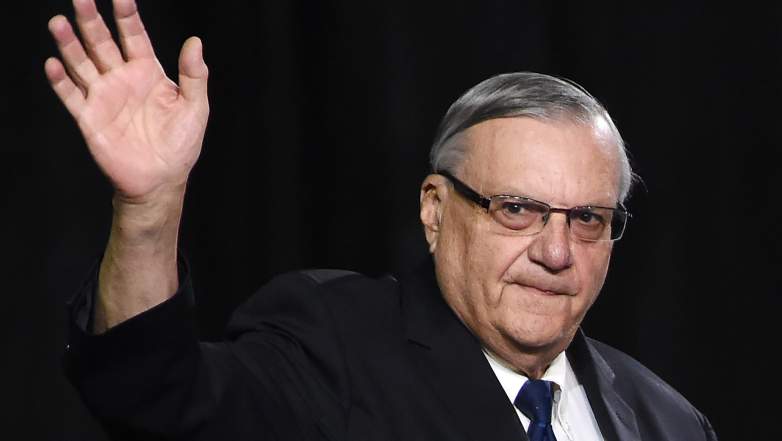
GettyJoe Arpaio in October 2016.
The County Attorney’s newsletter also mentions that Mitchell was part of a team that won an award for dealing with a “sex assault backlog.”
Some critics on Twitter have linked Rachel Mitchell with controversial Sheriff Joe Arpaio. He ran a different agency, not the County Attorney’s office where she has worked. However, in 2011, The Associated Press published an expose about Arpaio’s handling of sex crime cases, reporting that “more than 400 sex-crimes reported to Maricopa County Sheriff Joe Arpaio’s office during a three-year period ending in 2007 — including dozens of alleged child molestations — that were inadequately investigated and in some instances were not worked at all.”
According to AZFamily.com, Rachel Mitchell was also among prosecutors assigned to figure out why some Maricopa County Sheriff’s cases were not resolved or fully investigated. The Washington Post reported that Mitchell was assigned to help “figure out which cases were still viable…She later conducted training sessions for the sheriff’s office, in hopes of avoiding a repeat.” The crimes dated from 2005-2007, the newspaper reported. Mitchell assumed her job as head of the unit overseeing sex crimes in January 2005 as part of an office shakeup that some criticized, according to an article in the Phoenix New Times. The article said the naming of another woman as a special assistant in the County Attorney’s office that was part of the same shakeup as “a clear signal that the County Attorney’s Office no longer will do battle with controversial Sheriff Joe Arpaio over what Romley staffers often viewed as legally impermissible excesses.” The office was being run by a new County attorney.
A 2013 story in the East Valley Tribune placed the blame on the “system,” largely the Maricopa County Sheriff’s Office. That newspaper had raised concerns about the Sheriff’s Office’s handling of crimes since at least 2008.
The caption with the photo on rape kits that includes Mitchell in the picture reads, “More than 4,000 untested sexual assault kits consisting of evidence collected from victims have been identified in Maricopa County. Concerns that this backlog could discourage victims from coming forward and potentially give serial rape offenders the opportunity to commit additional sex crimes, led the Office to create a sexual assault backlog program. MCAO formed a multidisciplinary team to develop a victim-centered Sexual Assault Protocol for investigations, forensic medical exams, victim notification and prosecution of sex offenses. In its first year the program had almost 2,000 kits sent for testing, leading to five sex assault charges being filed and thus far, one conviction.”
However, the site End the Backlog says a state audit in 2016 found that there were still more than 6,000 untested rape kits in Arizona. More than 4,300 were from Maricopa County. An open records request from an advocacy organization in Tucson helped spur some of the attention to the issue, the site says. Critics have pointed out that Mitchell was a sex crimes prosecutor for years at that point, and rape kit testing was up to the prosecutor’s discretion. AZCentral reported that advocates blamed a lack of funding, in part, and said the decisions for testing were often made at the police level.
You can read that 2016 state audit here. It reads, in part, “in reviewing the inventory, it is important to understand the history of why sex crimes evidence kits went untested or were not submitted to the crime laboratory for testing in the first place. Primary causes include limited resources for both police agencies and crime laboratories, investigative discretion and prosecutorial decision making.”
Mitchell has also prosecuted cases involving delayed reporting and has handled multiple cases involving priests accused of sexual abuse. For example, in 2006, Mitchell prosecuted Joseph Briceño, a former parish priest from Chandler, Arizona, who was accused of sexual conduct with a minor. The Arizona Republic reported that the victim took 10 years to report the alleged offenses, and prosecutors took another decade to go forward with the case. In another priest sex abuse case, Mitchell argued against lower bond for Rev. Karl LeClaire.
Rev. Paul LeBrun, a Catholic priest, was sentenced to 111 years in prison in a sex abuse case that Mitchell prosecuted. Mitchell called the stiff sentence “vindication” for the victims, saying, “It also tells people who have been victimized by people in authority that someone is listening and will do something about it.”
Mitchell was quoted in a story in the Phoenix New Times in 2011 that reported on a plea agreement the Maricopa County Attorney’s Office gave to David Nelson, “a former elder at the Madison Park Congregation Jehovah’s Witness Church in Phoenix” who was accused of sexually abusing a teenage boy in the 1980s. Although he had confessed, according to the New Times, he received six months in jail, probation, and must register as a sex offender.
Mitchell told the newspaper, in a discussion of that case, that “time anchors” defined as specific memories and times were important to prove older sex crimes cases, saying, “It’s not uncommon for victims, especially teenage male victims, to tell you, ‘I was this age when it happened.’ Then, when you get ‘time anchors’ from them, you find out they were actually older. It’s a normal thing to do where you have a coping mechanism [in which] they imagine that they were younger…”
5. Mitchell’s Boss Called Her Caring & She’s Won Awards as a Prosecutor
Rachel Mitchell’s boss praised her after news of her selection to question Dr. Ford. Maricopa County Attorney Bill Montgomery told AZFamily that Mitchell was a “professional, fair, objective prosecutor” who has a “caring heart” for victims.
The Arizona newspaper also reported that Rachel Mitchell was named “Arizona’s outstanding sexual-assault prosecutor” in 2003 and her office’s Prosecutor of the Year in 2006.
Mitchell told FrontLine that she had trained churches and schools on Arizona’s mandatory reporting laws. Mitchell went to law school at Arizona State, is licensed to practice law in Arizona, and was admitted to practice law in the state in 1992, according to a bio. The AZ Bar lists no disciplinary actions for her.
